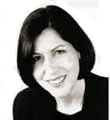
Froma Harrop
Of mad cows and junk science
http://www.jewishworldreview.com | MAD-COW DISEASE is way down on my worry list, and for two reasons. One is the number of Americans made sick by eating meat from a mad cow: zero. Two is the number of American cows ever found to have the disease: one, and it came from Canada.
But then I pick up the November issue of Vanity Fair and there's this fiery article about U.S. beef safety. Mad-cow disease, Eric Schlosser writes, "confronts the United States with perhaps its most serious and complex food-safety threat."
Schlosser gets around. His book Fast Food Nation continues to sell. He appears in classy magazines and rates polite interviews on CNN, NPR and other media outlets.
Yet his Vanity Fair piece offers not a shred of evidence that a mad-cow crisis is about to pounce. Schlosser gets by with some cheesy guilt-by-associations and dark stories of mad cows gone missing. His science is no more respectable than the anti-evolution "findings" of the "intelligent design" crowd.
Sophisticated magazines print articles about Darwin deniers, not by them. But Vanity Fair lets Schlosser write for eight glossy pages.
There's no denying that mad-cow disease (bovine spongiform encephalopathy) is dreadful. Humans who eat the spinal cord or brains of an infected cow can contract a terrible brain-wasting illness called variant Creutzfeldt-Jakob disease. An outbreak in Europe and Asia a few years ago took about 150 lives.
Was I missing something? Is there a hidden threat that only Schlosser is on to?
I called George Gray, the director of the Harvard Center for Risk Analysis. Part of the Harvard School of Public Health, the center has studied the risks of mad-cow disease for five years. I read Gray the line about the mad-cow threat, and he responded, "Achhhh."
Gray said Harvard's exhaustive investigation found that "the risks are very, very low, and the government is taking steps that are making already low risks lower."
Since 1997, the U.S. Department of Agriculture has banned the use of "ruminant-derived feed," which could pass the disease to cows. It is now testing 6,000 high-risk cows a week, and has yet to come up with a single new case.
(Be also aware that a person can eat meat from a mad cow without getting sick. The disease is passed to humans only through the cow's central-nervous-system tissue, which Americans rarely eat. Europeans do.)
Schlosser offers vague stories suggesting that the USDA lets rogue members of the beef industry play fast and loose with its rules. But the Harvard analysis even took some cheating into consideration.
"We didn't assume everyone else was an angel," Gray said, "and the risk was still low."
Schlosser nevertheless sees a mad-cow pathogen on the march — made possible by America's "centralized and industrialized system for producing meat." I find factory farms unappealing myself, but the fact remains that the serious outbreaks of mad-cow disease took place not here, but on Europe's quaint old-world farms.
Schlosser's charge — that the food industry cuts corners in fighting mad-cow disease just to save a few bucks — is nuts. A beef-safety crisis is an absolute nightmare for these people. In 1993, when hamburgers containing E. coli bacteria sickened diners at Jack in the Box restaurants in the Pacific Northwest, the fast-food chain nearly went out of business.
When that one mad cow was found near Yakima, Wash., a year ago, export markets for American beef collapsed overnight. American ranchers called it "the cow who stole Christmas."
Why do otherwise reputable media outlets traffic in this junk science? I will spare readers the usual charges of liberal bias. It's more geographical bias. Editors and producers don't travel much in ranching circles. They can get real casual about livelihoods in western Nebraska without taking big social risks.
But the bigger problem is probably laziness. Rather than read Schlosser's claims with a critical eye, editors and producers figure that the author has sold a lot of books, and other media gatekeepers take him seriously, so he must be okay.
I understand that a book debunking evolution, Of Pandas and People, is having brisk sales these days. It's full of scientific-sounding stuff, and I'm sure the authors, Percival Davis and Dean Kenyon, would be delighted to tell Vanity Fair's readers what's wrong with Darwin. I look forward to the article.
Froma Harrop is a columnist for The Providence Journal. Comment by clicking here.

